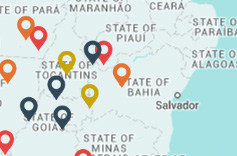National Prison Pastoral / Support and Accompaniment Association – Asaac
Prevention of torture and cruel, inhuman or degrading treatment against provisional detainees
São Paulo
Objetivos e público prioritário
Reducing the practice of torture against provisional detainees through monitoring prison units, denunciation of torture and the register of its occurrences in Brazil and specifically in the state of São Paulo.
Main activities
– Legal assistance to the victims of torture;
– Training for lawyers who will work on the project; and for Pastoral agents in Brazil and São Paulo;
– Mapping of torture occurrences throughout the country through the registering of torture cases in a database;
– Advocacy in the São Paulo state government, National Congress and Ministry of Justice to include proposals aiming for the eradication of torture in their political agendas;
– Publication of a report of all work done showing the results, advancements and future challenges for the confronting of torture against provisional detainees;
– A public event to share the lessons learned during the project and promote further action.
Context
Torture did not disappear when Brazil ended the dictatorship and re-established the Rule of Law, but rather, become more sophisticated, with its techniques improved to leave no physical traces, providing it invisibility and keeping it far from society’s watchful eye. No country has been able to eradicate this evil, which mostly affects imprisoned minorities. Nonetheless, Brazil has aligned itself with the international community’s efforts to definitively eliminate its practice as a punishment or interrogation mechanism used by State agents.
To make the commitment to eliminate torture as established in the Federal Constitution effective, Brazil incorporated into its legal rules the international treaties that deal with the prohibition of torture. The effective criminalization of the practice occurred in 1997, via Law 9.455/97. Meanwhile, among other issues, the law also defined the crime as common, meaning anyone could practice it: nannies, stepfathers, fathers, uncles, which removed the focus from those agencies responsible for supervising violence committed by agents of the State.
The exact number of cases of torture registered against provisional detainees in the state of São Paulo isn’t possible to ascertain, because under-notification is the rule when dealing with torture, especially when practiced by agents of the State. Even so, the Prison Pastoral, together with other organizations and universities, conducted a survey with prisoners in São Paulo on two occasions in order to estimate the number of cases of violence perpetrated by public agents against prisoners and provisional detainees. In the first study, carried out in 2011 with provisional detainees, it was found that nearly 75% alleged they had suffered physical violence at the moment of their arrest. In the second study, from 2013 with convicted prisoners, they were asked if they had suffered violence during or following their arrest, that is, while they were provisional detainees. Among these, 54% confirmed that they had suffered violence. These same prisoners were asked if they had suffered violence during the previous six months, that is, once their legal and imprisonment situation had stabilized, and positive responses decreased to just 6% of these surveyed. These numbers are significant and demand special attention be given to provisional detainees, since they are the most vulnerable group in terms of suffering violence at the hands of public law enforcement agents.
About the organization
The mission of the Prison Pastoral is to offer religious and humane assistance to prisoners and former inmates of the prison system, as well as their families. The work revolves around two axes, one strictly religious whose objective is to fulfill the constitutional mandate to offer religious assistance and the other, focused on the human rights of these same people.
Throughout the last twenty years, the Prison Pastoral has worked hard on the problem of torture and now adopts a strategy to combat it through two approaches: preventative and reactive. The preventative approach is carried out mainly through regular visits to prison locations, which Pastoral achieves via its volunteer base throughout the country; the reactive consists of forwarding notitias criminis (formal denunciations) to the authorities responsible for investigating allegations of torture.
Currently the Prison Pastoral is the only civil society entity of national scope and in defense of human rights that has direct access to the inside of prisons.
Results
105 cases of torture were monitored, analyzed and collected in a database. Training activities were held in various states and visits were made to dozens of prisons in different regions of the country. According to the project report, the 105 cases analyzed are divided between 16 states, plus the Federal District. Gender distribution shows that in 67% of the cases men are victims and in 46% it is women. For the most part, violations are multiple and related. The project also provided legal assistance to victims; advocacy actions before the government of São Paulo, the National Congress and the Ministry of Justice for them to include in their political agendas proposals aimed at stopping torture; and a public seminar to share the experience.
Report “Torture in times of mass incarceration” (Portuguese).
Funding Line
Criminal Justice / Rio de Janeiro e São Paulo (2014)
Year
-
Total Granted
R$ 307,800
Duration
24 months
Main Themes
Guaranteeing the rule of law and criminal justice






